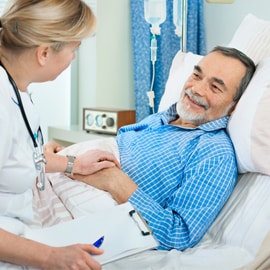After undergoing gastric band, gastric bypass or sleeve gastrectomy surgery, you will progress through a series of steps with your surgical care team to ensure your comfort and get you back on your feet as soon as possible.
While in your post-surgery recovery phase, patients should know that everything is manageable. You may feel little pain or discomfort, but this can easily be managed with medication. You may even feel slightly disoriented, but this feeling will subside quickly as you ease back into your regular day-to-day life.
In the Recovery Room

Most patients will feel drowsy and slightly confused when they first awake in the recovery room and will likely have very little memory of their stay in this room altogether. You may be able to recognize that you’re connected to machines that monitor your heart rate, blood pressure and vital signs and may even notice nurses nearby. Most patients will be in the recovery room for approximately 45 minutes or until fully alert. Once you’re awake and your vital signs are stable, you will then be taken to your room in the surgical care unit.
Once in Your Room
You will feel very tired and sleep for most of the day of your procedure—just what your body needs to begin the healing process. Nurses will continue to monitor you closely and will check on you every hour at first, then every other hour as you remain resting. While in your surgical care room, you may have ice chips if you mouth is dry. During your surgical procedure, you may have had a catheter placed in your bladder. It will be removed in one day if your urine flow appears adequate.
First Few Days of Recovery and Diet
The first few days following your surgery are critical for your stomach and intestine to heal. Depending on the bariatric procedure, you will slowly progress from sips of water to clear liquids. While you remain at the hospital, you will continue to receive heparin every twelve hours. If you have a fever or experience any nausea or pain, nurses may give you additional medications.
Pain will vary from patient to patient so it’s important to notify your nurse if you need any or additional pain medication. If you have diabetes, your blood sugar will be assessed every six hours and insulin will be provided if needed.
As your body heals, coughing and deep breathing are important to prevent complications like pneumonia. As a result, your breath volume will be measured regularly to ensure that it’s sufficient. You will also have pumps on your feet during your stay in the hospital to prevent blood clots from forming or developing further. These pumps should only be removed when you are sitting in a chair or walking.
Dr. Taylor will check on you every day to see how your body is recovering. Typically, all tubes except for the IV will be removed so you can begin to get up and move around more freely. Your strength will increase with each passing day and you will be encouraged to walk several times during your stay at the hospital.
As you continue to recover from surgery, you may experience the following symptoms:
- Weakness
- Fatigue
- Nausea
- Surgical pain
- Emotional ups and downs
All of these post-surgical symptoms are normal and will pass over time as your body continues to heal. Continue reading to learn about Movement in the Days after Weight Loss Surgery.
Suggested Reading
Long-Term Success with Weight Loss
Eating and Exercise Behavioral Changes to Lose Weight
Eating in Restaurants After Weight Loss Surgery
Also In This Section
- Bariatric Surgery May Restore Monthly Cycles in Obese Women
- Bariatric Surgery May Prevent Heart-Related Incidents
- For Diabetes, Surgery a Better Option than Standard Treatment
- Help Cholesterol by Losing Weight
- Speaking With Your Physician May Enhance Your Weight Loss Efforts
- Improve Migraines with Weight Loss Surgery
- Flu Shot Less Effective for the Obese
- Benefits of Weight Loss before Bariatric Surgery
- Keep Up with Weight Loss
- Warm Up Your Body Even In Cold Weather
- Life after Weight Loss Surgery
- Health Risks Associated with Obesity
- Ten Reasons You Should Lose Weight
- Bariatric Surgery Can Help You to Fight Obesity
- How to Begin Exercising After Gastric Bypass Surgery
- New Risk Calculator Assists Patients Considering Bariatric Surgery

